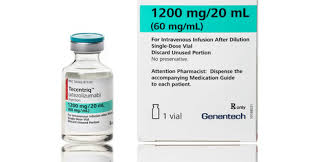Roche Korea said the company had presented results from a phase 1b study evaluating the efficacy and safety of Tecentriq in combination with Avastin as a treatment for people with unresectable hepatocellular carcinoma (HCC).

The company released its findings during the European Society for Medical Oncology (ESMO) 2019 Congress in Barcelona, Spain.
Data from the non-randomized Tecentriq and Avastin cohort showed clinically meaningful and durable responses after a median follow-up of 12.4 months, with a confirmed objective response rate (ORR) of 36 percent by central review per RECIST v1.1.
The data also showed that 12 percent of people had a complete response to treatment, and a median duration of response (DOR) was not yet reached.
Median progression-free survival (PFS) by central review per RECIST v1.1, a secondary efficacy endpoint in the study, was 7.3 months. Safety for the combination of Tecentriq and Avastin appeared to be consistent with the known safety profile of the individual medicines. No new safety signals were identified.
For the randomized portion of the study, evaluating the combination approach with Tecentriq and Avastin versus Tecentriq alone, the primary efficacy endpoint of PFS as assessed by central review per RECIST v1.1 was met, with the combination reducing the risk of disease worsening or death by 45 percent compared with Tecentriq monotherapy.
After a median follow-up of 6.6 months, the results demonstrated the superiority of the combination of Tecentriq and Avastin over Tecentriq monotherapy.
Median PFS in the Tecentriq and Avastin arm was 5.6 months compared with 3.4 months in the Tecentriq monotherapy arm.
The company is evaluating additional secondary endpoints of the group, and at this time, the data remain immature.
“We are encouraged by these latest results, which show promising progression-free survival and confirmed objective response rates in people with unresectable hepatocellular carcinoma, a disease for which the unmet medical need is particularly great,” said Sandra Horning, Roche’s chief medical officer and head of global product development. “These data strengthen our belief in the combination of Tecentriq and Avastin in this common form of liver cancer, and we look forward to the results from our Phase III study, IMbrave150.”
In July 2018, the U.S. Food and Drug Administration granted Breakthrough Therapy Designation (BTD) for Tecentriq in combination with Avastin as a first-line treatment for advanced or metastatic HCC based on data from this phase 1b study.
Earlier the year, the company completed enrollment for IMbrave150 (NCT03434379), an open-label, multicenter, randomized phase 3 study investigating the combination of Tecentriq and Avastin versus sorafenib in people with unresectable HCC who have not received prior systemic therapy.
Roche plans to unveil the study results later this year.

